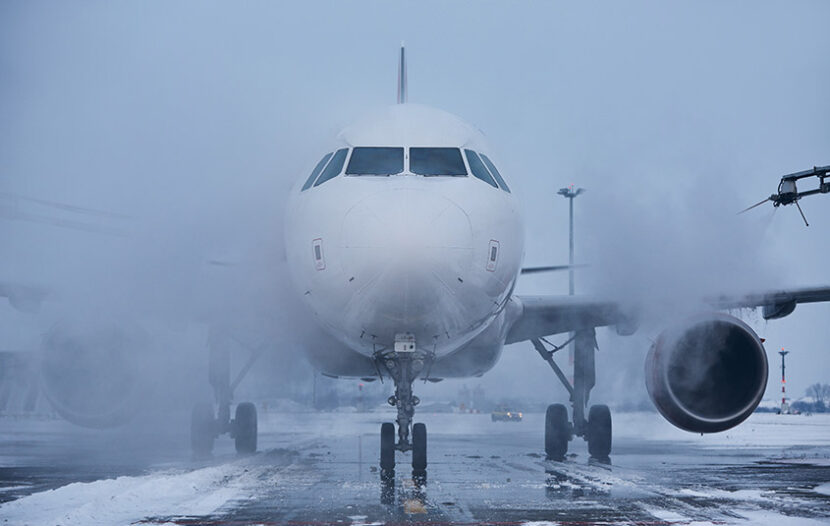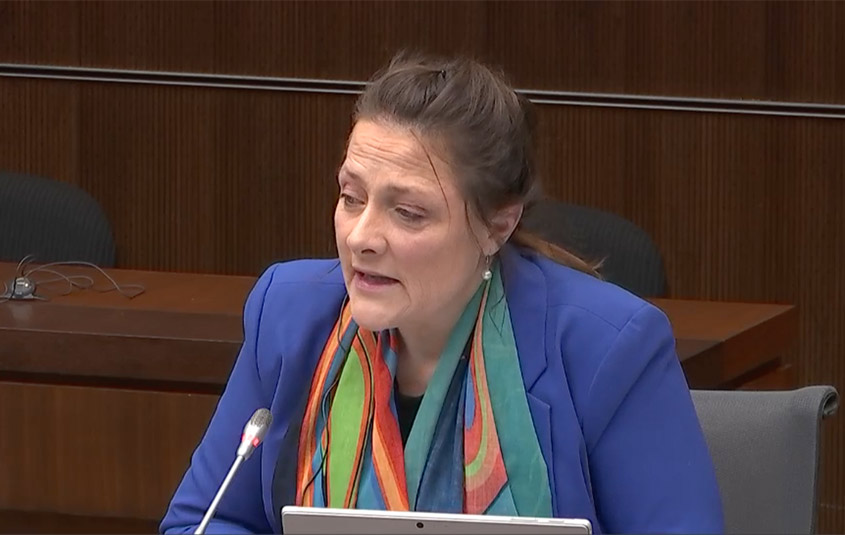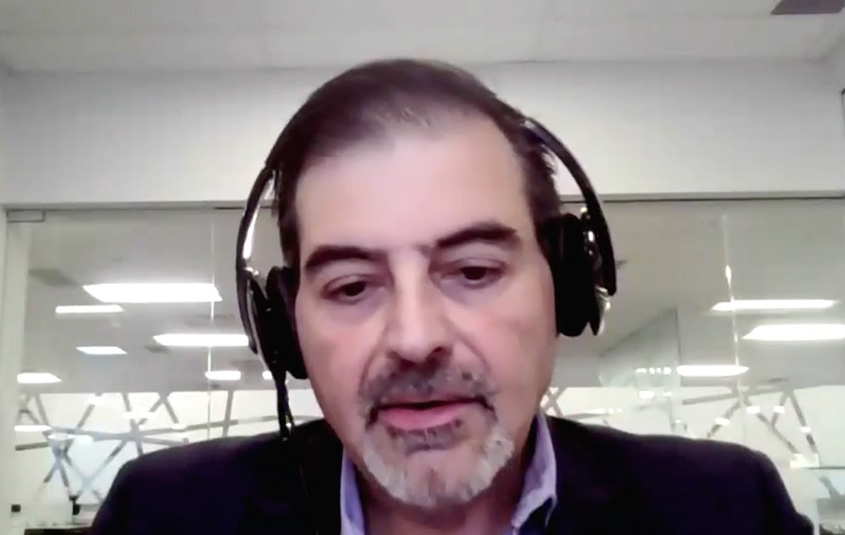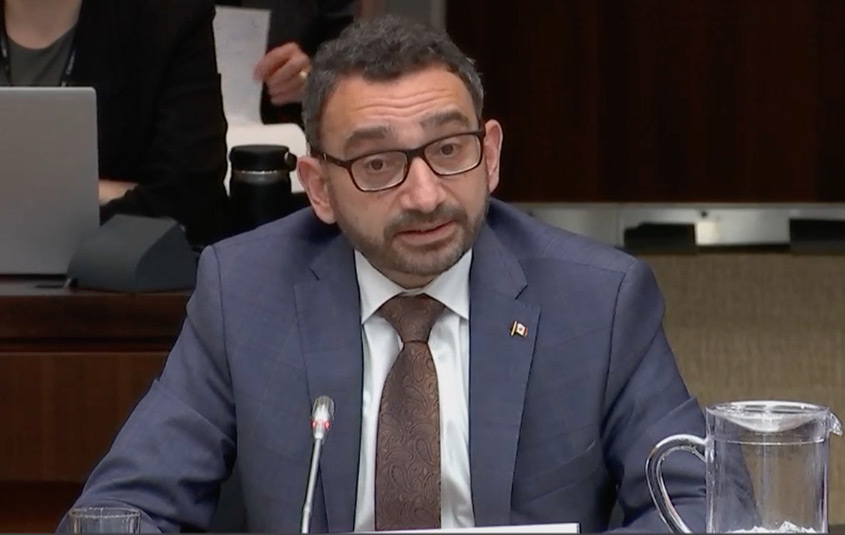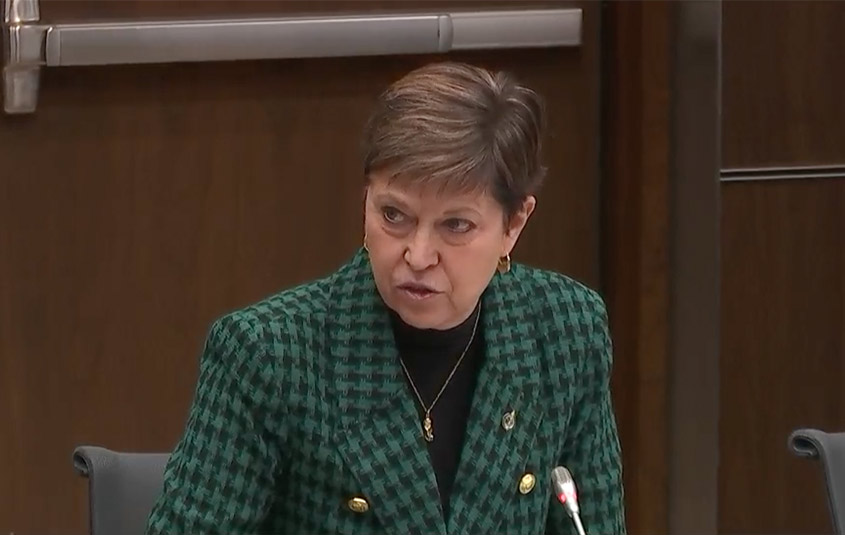TORONTO — Representatives from Canada’s airline industry were questioned for hours yesterday about the impact of the holiday season’s travel chaos on travellers, and – thanks to at least one MP’s inquiries – on travel agents too.
The House of Commons transport committee’s look at the problems that affected travellers over the December 2022 holiday break included testimony from executives at Air Canada, Sunwing and WestJet, executives at the Montreal, Toronto and Vancouver airport authorities, Transport Minister Omar Alghabra and officials from the Department of Transport and the Canadian Transportation Agency.
“THIS WAS A CATASTROPHIC FAILURE”: MP STRAHL TO SUNWING
The airlines were up first and MP Julie Vignola aimed a question at Sunwing, specifically about travel agents.
Sunwing Airlines president Len Corrado and Sunwing’s President of Tour Operations, Andrew Dawson represented the airline and tour operator at the emergency meeting.
- MP Julie Vignola
- Sunwing Airlines president Len Corrado
Vignola noted that in the wake of Sunwing’s SK cancellations she heard from travel advisors, including independent travel advisors, adding that this sector is made up primarily of women who are small-business owners.
She asked Sunwing if it’s “common for you to not pay the agencies who are selling your trips?”
Dawson took the question. “It is common practice in our industry to pay commission only on completed trips. It is an industry practice.”
Sunwing’s recall for agent commissions on cancelled Regina and Saskatoon departures and packages resulting from Sunwing’s decision to temporarily suspend its operations out of Saskatchewan through early February has received considerable push-back from SK travel advisors, and ACTA.
Corrado said Sunwing got word on Dec. 9 that its application to bring on foreign temporary pilots for the winter was denied.
MP Mark Strahl asked why Sunwing continued to book travel for Canadians knowing about the setback with the foreign temporary pilots. “This was a catastrophic failure … abruptly pulling out of an entire province,” said Strahl.
Corrado said Sunwing took measures to mitigate the unexpected setback, using subservice operators. “We took action … but with the weather, the inability to position aircraft … unfortunately once delays start to happen, even with subservience operators, recovery becomes difficult.”
MP Annie Koutrakis asked what Sunwing is doing to make sure “this doesn’t happen again.”
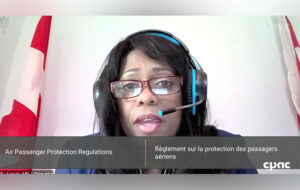
MP Leslyn Lewis
Corrado said Sunwing will continue to meet its obligations under the Air Passenger Protection Regulations (APPR), and has actively looked at reducing its schedule to create more slack. Sunwing is also reviewing its communication systems.
Earlier this month Sunwing apologized to travellers, and issued a statement to its travel agent partners as well.
Corrado reiterated his apology to Canadians yesterday. “We failed to deliver” at the level Sunwing strives for, he said. “We had some failures in execution for which we are very, very sorry. We know we could have done better, and we want to reassure Canadians and the committee that we are committed to the quality of experience we’ve provided for over 20 years.”
Asked by MP Leslyn Lewis about the number of complaints Sunwing has received in the wake of the holiday break disruptions, Dawson put the figure at 7,000, adding that the inquiries are a mix of requests for compensation, refunds and extra expenses incurred.
11 HOURS ON THE TARMAC FOR AC1055 DURING B.C.’S SNOWSTORMS
While Sunwing took the most heat at yesterday’s meeting, both Air Canada and WestJet were also called on to justify their part in the holiday travel chaos.
MPs grilled Air Canada for the Dec. 20 incident at Vancouver Airport, when Air Canada passengers arriving from Phoenix endured 11 hours on the tarmac, unable to deplane during fierce winter storm conditions and with reports of empty aircraft at the gates.
MP Taylor Bachrach asked why passengers on that Air Canada aircraft weren’t allowed to deplane, given the 3-hour rule.
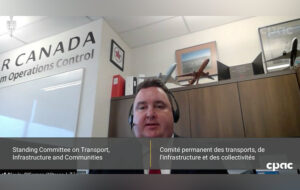
Air Canada’s Kevin O’Connor
Air Canada’s VP System Operations Control, Kevin O’Connor, said that when safety is in question, airlines aren’t required to follow the 3-hour deplaning rule. “We couldn’t get to the gate safely, we couldn’t disembark safely,” he said. “Nobody wanted to have customers onboard for 11 hours. But because of the gate gridlock, nothing was leaving. We were in constant communication with [YVR]. We will not make a situation worse. We will always abide by safety first and foremost.”
Between Dec. 22 and Jan. 8, more than 2 million passengers flew with Air Canada.
O’Connor said Air Canada went into the busy holiday season “very well prepared. We set aside 15 aircraft for recovery. We operated nearly 1,000 daily flights over the holidays. An Air Canada plane took off every 90 seconds.”
He added that in adverse weather situations, when large volumes of passengers are trying to rebook all at once, “it’s not always possible to immediately rebook passengers. But more than 107,000 customers did rebook over the holidays, and Air Canada brought in its flexible rebooking policy.”
He said that on Dec. 22 Air Canada also put out alerts proactively to passengers scheduled to fly on Dec. 23, giving passengers the opportunity to fly earlier if possible.
1,600 WESTJET FLIGHTS CANCELLED DEC. 16 – JAN. 8
WestJet flew more than 1.2 million passengers over the holidays. “We very much regret we had thousands of guests we couldn’t get to their destinations,” said Scott Wilson, VP Operations, WestJet.
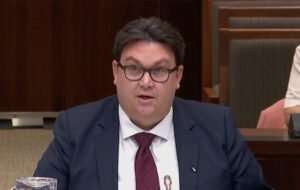
WestJet’s Andy Gibbons
Wilson pegged the number of cancelled WestJet flights between Dec. 16 and Jan. 8 at 1,600. On Dec. 23 WestJet announced it was proactively cancelling hundreds of flights amid the winter storms and crippling cold weather impacting B.C. and other parts of western Canada, and heading for Ontario.
WestJet’s Andy Gibbons, VP, Government Relations & Regulatory Affairs, noted that on Dec. 23, typically the busiest day of the holiday travel season, “all but one province had weather advisories.”
Gibbons called on the government to address “the most glaring gap in Canada’s consumer protection” for air travellers. While airlines are in part responsible and under scrutiny, many other sectors, including airport authorities, NAVCanada and more, also bear responsibility for getting air passengers were they need to go.
Air Canada’s Rheault concurred: “Our position is that the APPR rules should be reviewed to take into consideration all actors, so everyone who has a responsibility can be involved.”
“This is not about the blame game, it’s about improving the system overall. We want shared accountability,” added WestJet’s Gibbons.
Wilson said that in his 18 years at WestJet, he’d never experienced compound impacts from adverse weather quite like much of Canada experienced Dec. 18 – 24. “I’ve never seen anything like it,” he said.
- Transport Minister Omar Alghabra
- MP Pam Damoff
“OUR GOVERNMENT IS NOT HIDING”
All three airlines were taken to task for the lack of effective communication to passengers impacted by the holiday delays and cancellations. And all three said improved communication is on their list of lessons learned.
“It was an absolute mess,” said MP Pam Damoff. “You can’t control the weather. But you can control the plans you have to deal with it, and you can control how you communicate.”
Transport Minister Omar Alghabra reiterated the need for clear communication.
“Canadians deserve answers. They expect and deserve to be kept informed,” said Minister Alghabra during his testimony yesterday.
He called the holiday travel chaos “unacceptable.”
“Canadians are used to winter weather. And they are patient. What is unacceptable to me is when they are kept in the dark about alternate plans, when they are stranded … that to me is unacceptable.”
Minister Alghabra said the federal government is looking at making sure more of the burden for air travel service failures falls on the airlines, not the passengers. “The burden has always been on the airlines. We want to make it more so,” he said.
Canada is also looking at what other jurisdictions have done, like the EU, on air passenger rights, he said. The Liberal government brought in the APPR in 2019 and recently strengthened the rules in September 2022.
Minister Alghabra was also grilled by the committee, asked why the government doesn’t stand up to the airlines, and asked repeatedly where he was from late December through Jan. 5, while his office dealt with the holiday travel situation. “What do you want me be responsible for, the weather or Sunwing’s bad decisions?” asked Alghabra in a heated moment. He said he was directly involved in every decision, and that his office was in contact with the airlines on a daily and sometimes hourly basis.
The CTA, which also took part in yesterday’s emergency meeting, is currently dealing with a backlog of 33,000+ complaints.
“Too often the airlines tell passengers they’re not entitled to compensation when they really are,” said Minister Alghabra. He said he hopes to introduce new legislation in the coming months.
“Our government is not hiding,” he said. “We all assume our responsibilities and the industry must also assume theirs.”
